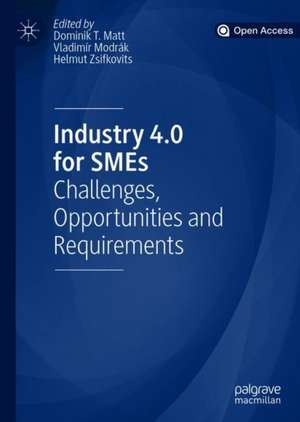Industry 4.0 for SMEs: Challenges, Opportunities and Requirements
Editat de Dominik T. Matt, Vladimír Modrák, Helmut Zsifkovitsen Limba Engleză Hardback – 30 ian 2020
| Toate formatele și edițiile | Preț | Express |
|---|---|---|
| Paperback (1) | 221.70 lei 43-57 zile | |
| Springer International Publishing – 30 aug 2021 | 221.70 lei 43-57 zile | |
| Hardback (1) | 242.99 lei 43-57 zile | |
| Springer International Publishing – 30 ian 2020 | 242.99 lei 43-57 zile |
Preț: 242.99 lei
Nou
Puncte Express: 364
Preț estimativ în valută:
46.50€ • 48.67$ • 38.70£
46.50€ • 48.67$ • 38.70£
Carte tipărită la comandă
Livrare economică 31 martie-14 aprilie
Preluare comenzi: 021 569.72.76
Specificații
ISBN-13: 9783030254247
ISBN-10: 3030254240
Pagini: 375
Ilustrații: XXXV, 412 p. 101 illus., 83 illus. in color.
Dimensiuni: 148 x 210 x 32 mm
Greutate: 0.88 kg
Ediția:1st ed. 2020
Editura: Springer International Publishing
Colecția Palgrave Macmillan
Locul publicării:Cham, Switzerland
ISBN-10: 3030254240
Pagini: 375
Ilustrații: XXXV, 412 p. 101 illus., 83 illus. in color.
Dimensiuni: 148 x 210 x 32 mm
Greutate: 0.88 kg
Ediția:1st ed. 2020
Editura: Springer International Publishing
Colecția Palgrave Macmillan
Locul publicării:Cham, Switzerland
Cuprins
Part I. Introduction to Industry 4.0 for SMEs.- 1. SME 4.0: The Role of Small- and Medium-Sized Enterprises in the Digital Transformation; Dominik T. Matt and Erwin Rauch.- Part II. Industry 4.0 Concepts for Smart Manufacturing in SMEs.- 2. SME Requirements and Guidelines for the Design of Smart and Highly Adaptable Manufacturing Systems; Erwin Rauch, Andrew R. Vickery, Christopher A. Brown and Dominik T. Matt.-3. Implementation of Industrial Internet of Things and CPS in SMEs for Distributed and Service-oriented Control; Rafael A. Rojas and Manuel A. Ruiz Garcia.- 4. The Opportunities and Challenges of SME Manufacturing Automation: Safety and Ergonomics in Human-Robot Collaboration; Luca Gualtieri, Ilaria Palomba, Erich J. Wehrle and Renato Vidoni.- Part III. Industry 4.0 Concepts for Smart Logistics in SMEs.- 5. Requirement Analysis for the Design of Smart Logistics in SMEs; Patrick Dallasega, Manuel Woschank, Helmut Zsifkovits, Korrakot Tippayawong and Christopher A. Brown.- 6. Consistent Identification and Traceability of Objects as an Enabler for Automation in the Steel Processing Industry; Helmut Zsifkovits, Johannes Kapeller, Hermann Reiter, Christian Weichbold and Manuel Woschank.- 7. State-of-the-art Analysis of the Usage and Potential of Automation in Logistics; Hlemut Zsifkovits, Manuel Woschank, Sakgasem Ramingwong and Warisa Wisittipanich.- Part IV. Industry 4.0 Managerial, Organizational and Implementation Issues.- 8. The Development of an Organizational Maturity Model in terms of Mass Customization; Vladmír Modrák and Zuzana Šoltysová.- 9. Implementing Industry 4.0 in SMEs: A Focus Group Study on Organizational Requirements; Guido Orzes, Robert Poklemba and Walter T. Towner.- 10. Smart SME 4.0 Implementation Toolkit; Apichat Sopadang, Nilubon Chonsawat and Sakgasem Ramingwong.- Part V. Case Studies and Methodical Tools for Implementing Industry 4.0 in SMEs.- 11. The Digitization of Quality Control Operations with Cloud Platform Computing Technologies; Kamil Zidek, Vladimír Modrák, Ján Pitel and Zuzana Šoltysová.- 12. The Implementation of a Laboratory Case Study for Intuitive Collaboration between Man and Machine in SME Assembly; Luca Gualtieri, Rafael A. Rojas, Manuel A. Ruiz Garcia, Erwin Rauch and Renato Vidoni.- 13. Axiomatic Design for Products, Processes and Systems; Christopher A. Brown.
Notă biografică
Dominik T. Matt holds the Chair for Production Systems and Technologies and heads the Industrial Engineering and Automation (IEA) research department in the Faculty of Science and Technology at the Free University of Bozen-Bolzano, Italy. Dominik is also the Director of Fraunhofer Italia, the largest applied research organization in Europe.
Vladimír Modrák is Professor of Manufacturing Technology at the Technical University of Kosice in Slovakia, where he previously studied. His research interests include cellular manufacturing design, mass-customized manufacturing and planning, and scheduling optimization. Since 2015 he has been a Fellow of the European Academy for Industrial Management (AIM).
Helmut Zsifkovits is Professor of Industrial Logistics at Montanuniversitaet Leoben, Austria, having previously studied at the University of Graz, Austria. His research interests revolve around logistics systems engineering, supply chain strategy and operations management. As well as teaching at universities in Austria, Latvia, Colombia and Germany, Helmut has professional experience in the automotive industry, logistics consultancy and IT.
Vladimír Modrák is Professor of Manufacturing Technology at the Technical University of Kosice in Slovakia, where he previously studied. His research interests include cellular manufacturing design, mass-customized manufacturing and planning, and scheduling optimization. Since 2015 he has been a Fellow of the European Academy for Industrial Management (AIM).
Helmut Zsifkovits is Professor of Industrial Logistics at Montanuniversitaet Leoben, Austria, having previously studied at the University of Graz, Austria. His research interests revolve around logistics systems engineering, supply chain strategy and operations management. As well as teaching at universities in Austria, Latvia, Colombia and Germany, Helmut has professional experience in the automotive industry, logistics consultancy and IT.
Textul de pe ultima copertă
This open access book explores the concept of Industry 4.0, which presents a considerable challenge for the production and service sectors. While digitization initiatives are usually integrated into the central corporate strategy of larger companies, smaller firms often have problems putting Industry 4.0 paradigms into practice. Small and medium-sized enterprises (SMEs) possess neither the human nor financial resources to systematically investigate the potential and risks of introducing Industry 4.0. Addressing this obstacle, the international team of authors focuses on the development of smart manufacturing concepts, logistics solutions and managerial models specifically for SMEs. Aiming to provide methodological frameworks and pilot solutions for SMEs during their digital transformation, this innovative and timely book will be of great use to scholars researching technology management, digitization and small business, as well as practitioners within manufacturing companies.
Caracteristici
Examines how the SME 4.0 concept can be implemented Provides a mix of research studies with best practice case studies Provides examples of successful implementations focusing on digital solutions
